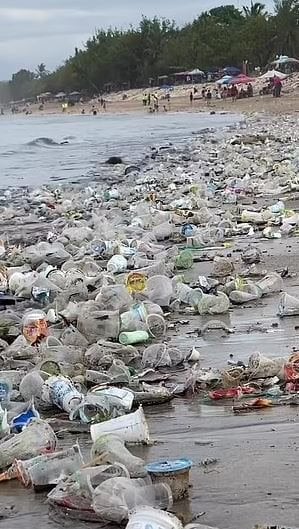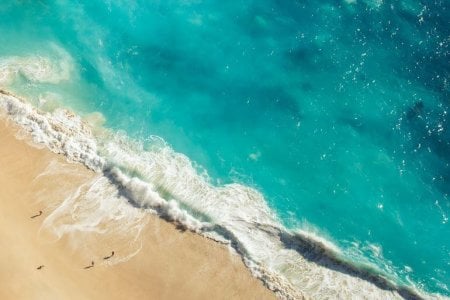Travel Alert: Horrifying Photos Reveal Bali's Disgusting Beach Transformation
- Replies 8
The island of Bali has been a popular holiday destination for Australians for decades. With its breathtaking beaches and vibrant culture, it’s no wonder many holiday-seekers from around the world are drawn to the iconic tourist destination.
However, there has been an alarming transformation to some of the most beloved beaches, leading many to question whether Bali is still the ‘perfect’ holiday spot it once was.
Australian tourists are coming back from their getaways in Bali with shocking and heartbreaking photos of kilometres of rubbish stretching along sunbathing hotspots.
Photos emerged showing the rising tide of rubbish overwhelming the island’s main beaches.
‘It’s a surprise. We’ve been here a fair few times. I’ve never seen it this bad,’ one tourist claimed.
‘Where do we sit these days and have a beer?’ They added.
Another Aussie tourist shared that they expected a ‘nice clear beach’ and were looking forward to having a few drinks.
‘We don’t even know where the chairs are going to sit to be honest,’ they said.
In the pictures they shared of Legian beach, it was clear that the holiday spot was drowning in rubbish.
Authorities have turned to loaders to help clear the mess, while other people have been tasked with cleaning up the rubbish-strewn sand by hand.
According to reports, the excessive rubbish covering the shores is due to the nearby landfill sites. Some of the region’s largest landfill areas are a mere 25 minutes away by boat.
This comes after another tourist took to social media to share their ‘disgusting’ discovery while visiting Kuta beach – another popular tourist spot in Bali. According to the traveller, he had just arrived at his destination but was shocked at how the beach was littered with plastic cups and various packaging.
While many lamented the state of the holiday spot, some social media users said that the rubbish the tourist found appeared to have come from build-up in nearby canals. More details about this story can be read here.
Indonesia Institute Founder Ross Taylor explained: ‘With these heavy monsoon rains it’s inevitable that a lot of that landfill rubbish, including an immense amount of plastics, will be washed into the ocean and will head straight for Bali.’
Authorities in Bali had predicted the worst of conditions would be experienced in the early part of the year.
During the wet season, tonnes of water bottles, food packaging, straws, cutlery and bags washed into the sea and rivers are carried by ocean currents and dumped on Bali's Kuta, Seminyak, Legian and Jimbaran beaches daily. In December and January, the entire east coast of Bali gets inundated with trash.
In 2021, Indonesia’s volume of waste neared 70 million tonnes, which was almost double the amount recorded a decade ago. Plastic waste accounted for 17 per cent of the recorded number.
The island briefly received some relief from its plastic plague during COVID when visitor numbers plummeted from 5.5 million to just 100,000 a year. But because tourism is back at record levels after pandemic restrictions have lifted, experts shared that Bali’s waste systems are ‘struggling to cope’.
Mr Taylor said there were things tourists could do to help limit the amount of waste that ends up in a landfill and on beaches.
‘Bali has already banned single-use plastic bags and single-use bottles. Go for larger bottles or take your own water bottle from home and just top it up at your hotel,’ he suggested.
This advice comes amid warnings from experts over another danger lurking in Bali, forcing tourists to spend their holidays at hospitals.
One Bali tourist had to face a case of ‘Bali Belly’ caused by consuming bacteria found in contaminated food and water. Symptoms include abdominal pains, hot and cold sweats, slight fever, nausea or vomiting, and aching joints. Those with severe cases experience symptoms for up to five days. You can read more about the tourist’s experience here.
 Have you ever visited Bali? Share your thoughts in the comments below!
Have you ever visited Bali? Share your thoughts in the comments below!
However, there has been an alarming transformation to some of the most beloved beaches, leading many to question whether Bali is still the ‘perfect’ holiday spot it once was.
Australian tourists are coming back from their getaways in Bali with shocking and heartbreaking photos of kilometres of rubbish stretching along sunbathing hotspots.
Photos emerged showing the rising tide of rubbish overwhelming the island’s main beaches.
‘It’s a surprise. We’ve been here a fair few times. I’ve never seen it this bad,’ one tourist claimed.
‘Where do we sit these days and have a beer?’ They added.
Another Aussie tourist shared that they expected a ‘nice clear beach’ and were looking forward to having a few drinks.
‘We don’t even know where the chairs are going to sit to be honest,’ they said.
In the pictures they shared of Legian beach, it was clear that the holiday spot was drowning in rubbish.
Authorities have turned to loaders to help clear the mess, while other people have been tasked with cleaning up the rubbish-strewn sand by hand.
According to reports, the excessive rubbish covering the shores is due to the nearby landfill sites. Some of the region’s largest landfill areas are a mere 25 minutes away by boat.
This comes after another tourist took to social media to share their ‘disgusting’ discovery while visiting Kuta beach – another popular tourist spot in Bali. According to the traveller, he had just arrived at his destination but was shocked at how the beach was littered with plastic cups and various packaging.
While many lamented the state of the holiday spot, some social media users said that the rubbish the tourist found appeared to have come from build-up in nearby canals. More details about this story can be read here.
Indonesia Institute Founder Ross Taylor explained: ‘With these heavy monsoon rains it’s inevitable that a lot of that landfill rubbish, including an immense amount of plastics, will be washed into the ocean and will head straight for Bali.’
Authorities in Bali had predicted the worst of conditions would be experienced in the early part of the year.
During the wet season, tonnes of water bottles, food packaging, straws, cutlery and bags washed into the sea and rivers are carried by ocean currents and dumped on Bali's Kuta, Seminyak, Legian and Jimbaran beaches daily. In December and January, the entire east coast of Bali gets inundated with trash.
In 2021, Indonesia’s volume of waste neared 70 million tonnes, which was almost double the amount recorded a decade ago. Plastic waste accounted for 17 per cent of the recorded number.
The island briefly received some relief from its plastic plague during COVID when visitor numbers plummeted from 5.5 million to just 100,000 a year. But because tourism is back at record levels after pandemic restrictions have lifted, experts shared that Bali’s waste systems are ‘struggling to cope’.
Mr Taylor said there were things tourists could do to help limit the amount of waste that ends up in a landfill and on beaches.
‘Bali has already banned single-use plastic bags and single-use bottles. Go for larger bottles or take your own water bottle from home and just top it up at your hotel,’ he suggested.
This advice comes amid warnings from experts over another danger lurking in Bali, forcing tourists to spend their holidays at hospitals.
One Bali tourist had to face a case of ‘Bali Belly’ caused by consuming bacteria found in contaminated food and water. Symptoms include abdominal pains, hot and cold sweats, slight fever, nausea or vomiting, and aching joints. Those with severe cases experience symptoms for up to five days. You can read more about the tourist’s experience here.
Key Takeaways
- Tourists returning to Bali have shared their shock at the rising tide of rubbish overwhelming the holiday island’s main beaches.
- Authorities have turned to loaders to help clear the mess, while others have been tasked with cleaning the rubbish-strewn sand by hand.
- Indonesia’s volume of waste neared 70 million tonnes in 2021, almost double the amount recorded a decade ago.
- Experts have warned travellers not to drink tap water in Bali as it is 'not healthy' and advised them to follow the 'boil it, peel it or forget it' mantra.









